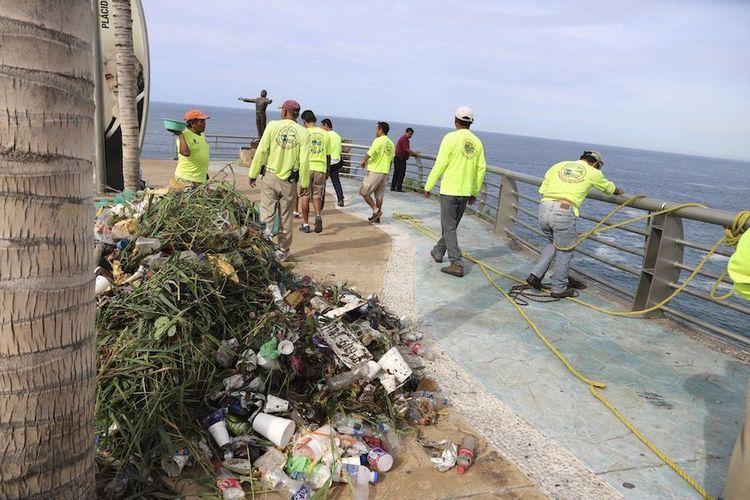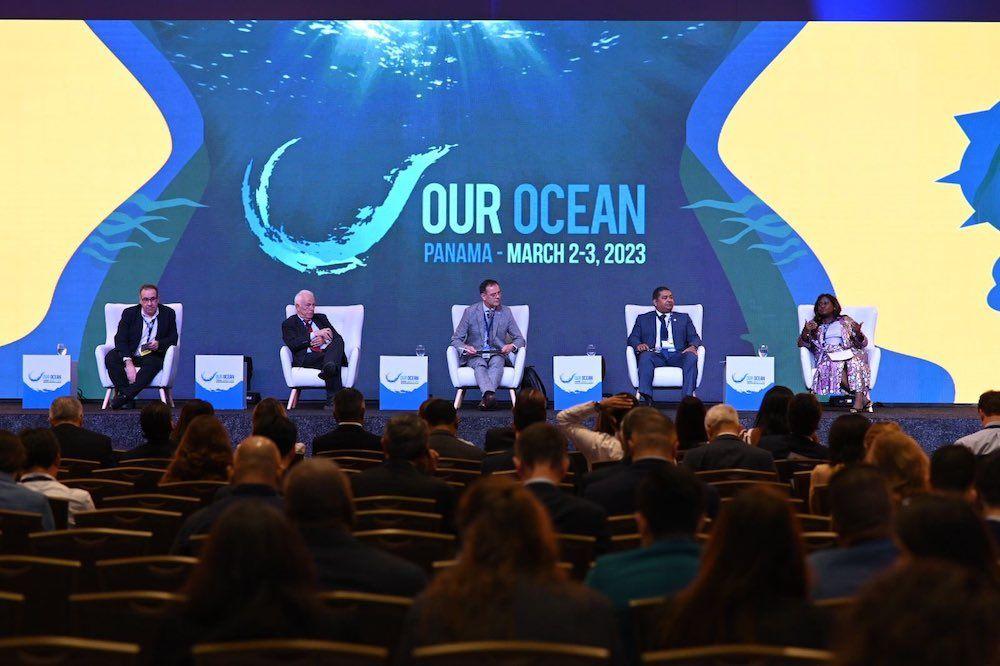The Our Ocean conference, which takes place in Panama on March 2 and 3, has been a meeting point for civil organizations and various sectors to highlight the importance of fighting against single-use plastics.
“It's a serious problem for the oceans, for the climate because it's a facilitator of climate change and for humans themselves. If they think the problem is bad now, wait for what is about to happen, the plastics industry expects to triple its plastic production in the next 30 years,” said Andrew Sharpless, executive president of Oceana, during his participation in the Global Action against Plastics panel.
In this context, the organization has warned that there are 14,982 million kilos of plastic waste flooding the oceans, while today 40% of this plastic is designed for one-time use.
“Basically, a package or a bottle, most of that is of unnecessary use, and when you think about it it's almost crazy to design something that will last forever for a one-time use,” Sharpless said.
To delve into this problem, Causa Natura Media interviewed Renata Terrazas, director of Oceana Mexico, who was also present at the conference.
— Oceana said that plastics are one of the biggest threats to our seas. Why is it important to highlight it in the framework of the Our Ocean conference?
Well, at Oceana we came to this Our Ocean conference to seek concrete commitments from governments regarding the reduction of single-use plastics, unfortunately it is still one of the biggest sources of pollution for the ocean.

Garbage collection in Acapulco. Photo: Dark room
Suddenly we think that the situation is over, that because we have already banned straws and bags, we have already solved everything. The reality is that every minute the equivalent of two trucks full of plastic continues to pour into the ocean.
If all the plastic in the ocean were a country, it would be the fifth largest pollutant, and the fifth largest contributor to climate change. So we have a gigantic problem with plastics that we cannot forget, the industry has been responsible for making us believe that the issue is the circular economy, that the issue is recycling. However, at Oceana we know that the important thing is to avoid producing unnecessary single-use plastics, especially those plastics, the design of these plastics is wrong.
— What role do companies play? Can policies be created based on the good will of companies or are laws necessary to compel them?
Let's see, there are two lines coming, of course it can be done. There are many companies that, mainly, what they offer is not plastic. Bottled drinks don't sell you the plastic, they sell you the liquid, the packages that arrive at your house wrapped in plastic don't sell you the plastic. They sell you the product that comes inside.
So for them it's relatively easier to switch to a model where there are no single-use plastics. It has already been done, for example, Amazon in India all its packaging is plastic-free, so what can it be made of, can it be done.
The second thing. The thing is that these companies can commit. Yes, those who deliver food on platforms have already done so. Those who sell soft drinks have already made a reduction. They have already been moving, there is a commitment from Coca-Cola so that by 2030, 25% of its production will be returnable. In other words, there are (committed companies), but the reality is that it is a combination.
Those companies that want to do it, welcome, but governments need to start regulating the production of this plastic, which happens with this plastic that is sold because it is cheaper. However, it is not considering environmental externalities or the management they cause to people, to governments. At the end of the day, all this plastic that is thrown away ends up being handled as waste and that waste costs the State.
So what's happening is that people are subsidizing these companies that use plastic cheaply and end up paying and managing our cities with our taxes.
— So what commitments are expected at this summit?
Yes, because we expect these commitments in plastics. We expect an announcement from Panama just today (March 2). Panama can lead the way in reducing single-use plastics in Central America.
Nowadays it is Chile that has the best legislation in Latin America, if not in the world. So we're expecting those kinds of commitments.
We are also seeking commitments regarding transparency in fisheries management. We need to know what is happening in our territorial sea in all countries, but also on the high seas.
We are going to issue a letter a statement of principles to work on fishing transparency who, how, where and with what is being fished. This is a call to different civil society organizations around the world to subscribe to these principles and start working in our countries for greater transparency in fisheries management.
There will also (it is expected) that there will be habitat protection commitments. We talk a lot about 30-30, 30% of the territorial sea of all countries will be protected by 2030. We are waiting for announcements from countries that are going to protect more of their territorial sea, but also, it is worth noting that this territorial sea must be protected against its greatest threats, for example, in Europe there is still bottom trawling in protected natural marine areas. So we need not only to declare extensions but also to implement them.
In short, we expect from this conference commitments for the reduction of single-use plastics, greater transparency, commitments for greater transparency in fisheries management and the declaration of protected natural areas in the sea with real protection measures.
— Would you expect, let's say, as civil society, perhaps greater involvement of the Mexican government in spaces like these?
It would be ideal, Mexico has to understand that it is part of a concert of nations where all these commitments must be made and made effective, greater transparency in fishing, reduction of single-use plastics and protection of habitat.
Yesterday we took an important step in this, not necessarily here at the conference, but the Senate approved the signing of the Port State Treaty, which is a very important step in the fight against illegal fishing, something that Mexico had in debt for many years.
After a long time, we have succeeded, but stronger steps must be taken to protect the oceans. Whether they don't have to come to conferences to make announcements, action must be taken.
These conferences lend themselves to having countries making these announcements and implementing public policies, but the work is done at home. So from the Mexican government we expect greater involvement in the protection of the oceans, we would expect the National Aquaculture and Fisheries Commission to be more involved and committed to the protection of the oceans, you can't see that, Conapesca has been absent from all the discussions about the protection of the oceans and the fisheries themselves.
So that would be the most urgent thing right now: involvement above all, Conapesca.



Comentarios (0)